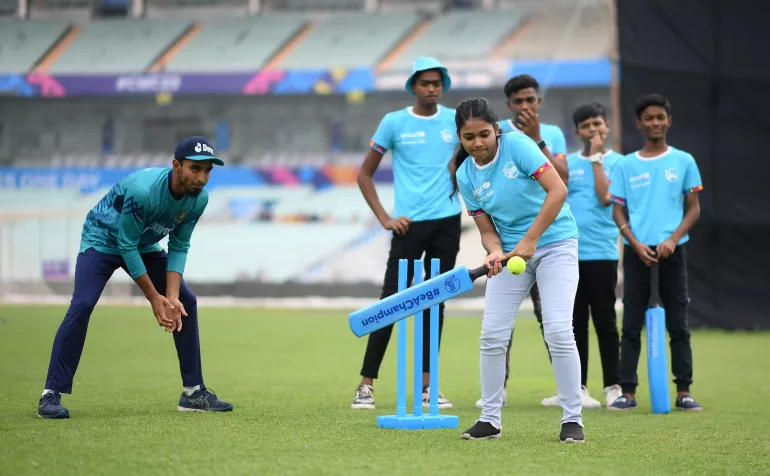Cricket is more than just a sport—it’s a source of inspiration that shapes young minds, builds confidence, and unites communities worldwide. From dusty fields in small villages to international academies, cricket has become a powerful force motivating young people to dream big, work hard, and pursue excellence both on and off the field.
The Global Appeal of Cricket
Cricket’s reach extends far beyond its traditional strongholds like India, England, and Australia. Today, the sport is gaining Jeetbuzz Login momentum in countries across Asia, Africa, the Caribbean, and even the Middle East. Youth are drawn not only to the thrill of the game but also to the sense of belonging and identity it provides.
Tournaments such as the ICC Under-19 World Cup have given young players a platform to showcase their skills internationally. These events not only nurture emerging talent but also inspire millions of fans to take up the game.
Building Character Through Cricket
Cricket teaches valuable life lessons that extend beyond the boundary lines. It fosters qualities such as discipline, patience, teamwork, and respect — all of which are essential for personal development.
Young players learn to:
- Stay composed under pressure.
- Accept both victory and defeat with grace.
- Work together to achieve shared goals.
- Develop leadership and decision-making skills.
These lessons make cricket a classroom for character-building, shaping youth into responsible and resilient individuals.
Role Models Who Inspire Youth
Cricketing legends have become symbols of hope and determination for millions of young fans. Players like Sachin Tendulkar, Ben Stokes, Babar Azam, and Ellyse Perry have shown that hard work and dedication can turn dreams into reality.
Their journeys — often from humble beginnings to international fame — encourage youth to pursue their goals despite challenges. When young players see athletes from similar backgrounds succeed, they realize that greatness is within reach through effort and perseverance.
Cricket as a Tool for Social Change
In many developing countries, cricket serves as a bridge between different social and economic groups. Grassroots Jeetwin cricket programs bring together children from diverse communities, promoting inclusion and equality.
Organizations and foundations also use cricket to teach life skills, promote education, and combat social issues like gender inequality. For example, girls’ cricket programs in countries like India and Bangladesh have empowered young women, helping them gain confidence and visibility through sport.
Mental and Emotional Growth Through the Game
Cricket challenges players mentally as much as it does physically. Youth who play the sport learn how to handle stress, bounce back from setbacks, and focus on long-term improvement.
The game demands patience and resilience — whether it’s waiting for the right ball to hit or bouncing back after a poor performance. These experiences help young players develop emotional intelligence, which benefits them in other areas of life such as academics and relationships.
Encouraging Leadership and Teamwork
Cricket’s structure naturally encourages leadership. Captains must make quick decisions, strategize, and motivate their teams — qualities that translate into real-world leadership skills. Even players who aren’t captains learn teamwork by supporting others and contributing to collective success.
For youth, these experiences build a foundation for future careers, teaching them to communicate effectively, lead with empathy, and handle responsibility.
Providing Opportunities for Education and Career
Cricket has opened doors to education and professional opportunities for countless young athletes. Scholarships, training programs, and domestic leagues allow talented players to continue their studies while pursuing their sporting ambitions.
In nations like Sri Lanka, South Africa, and Afghanistan, cricket has helped lift young people out of poverty, offering pathways to stable and rewarding careers. The sport not only provides financial opportunities but also fosters pride and unity in representing one’s country or community.
The Spirit of Global Connection
Cricket’s international nature connects young fans and players from around the world. Through online communities, tournaments, and cross-border exchanges, youth learn to appreciate diversity and respect other cultures.
This global camaraderie promotes peace and friendship, showing how sport can unite people beyond language, religion, or nationality. The “spirit of cricket” — emphasizing respect and fairness — teaches young players to value sportsmanship over rivalry.
Inspiring the Next Generation of Players
Cricket’s future lies in the hands of today’s youth. With social media, coaching academies, and increased accessibility to equipment, more young people than ever before are picking up bats and balls. Watching their idols on TV or online motivates them to practice, compete, and chase their own cricketing dreams.
As these young players grow, they not only strengthen the sport’s legacy but also carry forward its values of integrity, respect, and unity.
FAQ
- How does cricket benefit youth beyond sports?
Cricket teaches life skills such as teamwork, leadership, discipline, and resilience, helping young people succeed in school, work, and personal life. - Why is cricket popular among young people globally?
The sport’s excitement, strong role models, and opportunities for social mobility make it appealing to youth across different cultures and regions. - How do cricket programs support youth development?
Grassroots and community cricket initiatives provide training, education, and mentorship, empowering youth to develop both athletic and personal skills.


